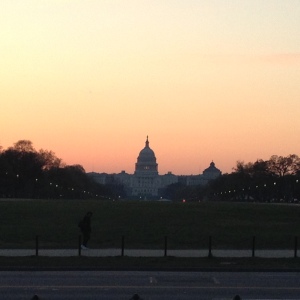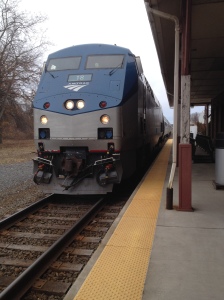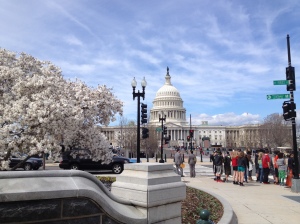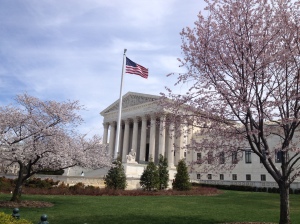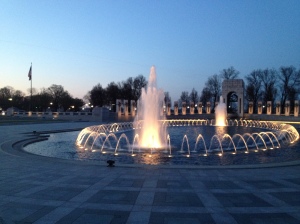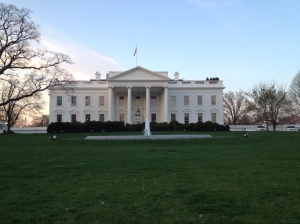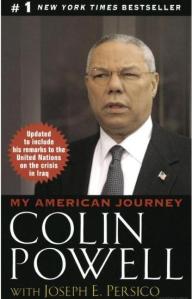A recent meeting took me to DC for a few days, and because I took the train down the night before, I had a little free time to spend. Thus I found at least one answer to the question of what a former Fellow does when returning to her Capital roots.
Even the trip down to Washington felt like a return to my fellowship year since I took Amtrak. It was a delight to arrive at the station a mere 15 minutes before my scheduled departure, park for free, and not deal with security, taking off shoes, checking a bag, or any of the hassles of flying. I simply hopped on the train, plugged in my laptop and settled in for a long comfortable uninterrupted time for getting caught up on work.
I arrived in Union Station around 10 PM. As a former DC native, I knew that it was actually much faster to take the Metro to my hotel than to wait in line for a taxi. Having a pre-charged metro pass made the process even easier. I chuckled at the nostalgia I experienced on the way as I passed the familiar stations: “Judiciary Square- where the National Building Museum is. Gallery Place/Chinatown where the National Portrait Gallery is. Metro Center for shopping and shows.” When I left back in August, I had expanded my bucket list multiple times, and there weren’t many if any experiences I felt I had missed. I realized upon my return, however, that I’m ready to do them all over again. As one of my fellow Bennet fellows told some new folks who were complaining that they were bored, “There are 1000 things to do around here, and Laura Pence did them all!”
One of the challenges of my recent visit was that I wasn’t going to be available for any evenings to meet up with people. I was reluctant to ask anyone to get up too early, but I should have remembered sooner that Fellow Maggie has always been up for anything. We got together at 6:45 AM and walked the Mall through the morning fog. We started by coming down behind the White House, and then headed off for the Lincoln Memorial. We even found something new to do and found another early bird to take our picture with the statue of Albert Einstein. We asked our photographer what kind of nerd he was, and he said, “I’m a pretty extreme nerd. I’m a librarian.” Maggie and I agreed later that we weren’t sure that a librarian really stacks up as an extreme nerd against a chemist and a chemical engineer, but we weren’t about to burst his bubble.
By the time we had walked from the Lincoln Memorial all the way up to the Capitol, we were somewhat caught up with each other’s latest adventures, and Maggie had to go to work. I went into the Russell Senate Office Building, where I used to work, and managed to navigate security at the entrance for non-Senate staff. The visitors who don’t go through security daily almost all needed two tries to get through the metal detector. I remained patient, and I was rewarded by getting a quick hug from the security guard after I got through (without setting off the metal detector, of course!) After a little shopping in the Senate Gift Shop, I spent some brief time with my former co-workers. It was a real pleasure to see them, and I do miss all the action of that office.
One of the main things I miss most about no longer being a Fellow is my Senate ID badge. While I was on staff, I made a point of wandering through the Capitol as often as I could, and I no longer have that privilege. My fellow Bennet Fellow helped me work around that limitation, and she corralled one of the interns to escort me through the tunnels to the Capitol. I was pleased that the Senate train was there to pick us up since I still enjoy the nostalgia of catching that ride.
Once in the Capitol, I easily navigated myself over to the Library of Congress where I used my Reader Card to gain access to the Main Reading Room. When I had told my upperclassmen that I was cancelling class for a meeting in DC, they were very impressed with my importance. I figured it would be appropriate to add luster to that reputation by grading inorganic problem sets in the Library of Congress. I did actually grade for a little while, but then I just looked around and soaked up the atmosphere and joy of being in such a beautiful space that not only has lovely architecture, but is also full of books!
I missed the peak of the cherry blossoms by only a few days, and it seemed that all of the flowering trees came into full bloom just over the course of a single day. I took a few pictures so that my friends and family from the chilly north would be assured that spring really is on the way.
My morning walk made sitting in a meeting all day easier to take, so the following morning, I decided to squeeze in another expedition to the Mall. In contrast with the fog from the day before, it was clear skies, and it was a treat to watch the sun rise over the monuments. The scaffolding is finally down from the Washington Monument, and since it has been closed since the 2011 earthquake, I’m wondering if it will be possible to go up again soon. It looks like I’ve restarted my DC bucket list after all.

